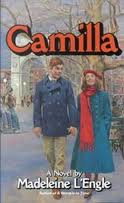 As the prelude to her guest book review for Camilla by Madeleine L’Engle, author Christina Hamlett (authorhamlett.com) says, “Don’t let the title fool you – it’s not about Prince Charles’ wife or Gonzo’s chicken girlfriend.” Read on to see what Christina says about this lesser known L’Engle classic.
As the prelude to her guest book review for Camilla by Madeleine L’Engle, author Christina Hamlett (authorhamlett.com) says, “Don’t let the title fool you – it’s not about Prince Charles’ wife or Gonzo’s chicken girlfriend.” Read on to see what Christina says about this lesser known L’Engle classic.
Title: Camilla
Author: Madeline L’Engle
Publisher: Farrar, Straus and Giroux (2009)
Reviewer: Christina Hamlett
There’s a wonderful line in “The Lion in Winter” in which Eleanor of Aquitaine candidly remarks to her husband, “I don’t much like our children.” Similar sentiments – yet this time spoken of parents – underscore the coming of age themes inherent in Madeline L’Engle’s “Camilla,” a book originally released in 1951.
The intrepid teen heroine, born and raised in a life of privilege on New York’s Upper East Side, has learned that not only is her beautiful mother a weak and flawed creature, but that she also expects Camilla’s unconditional love and loyalty to sustain her when her marriage threatens to unravel. Many of the uncanny parallels to my own parents’ relationship with each other and with me made the unfolding of events completely plausible. Even the mother’s messy attempt at suicide is not so much a reflection of despair about her transgressions as it is a calculated move to maintain the status quo and induce guilt on the part of her husband if he proceeds with any plans to divorce her. Juxtaposed against this backdrop of marital disharmony is Camilla’s latest balancing act between her manic-depressive best friend, Luisa, and Luisa’s older brother, Frank, an intellectual who doesn’t just encourage Camilla’s dreams; he also leads her to believe that he just might be a long-term part of them. Given the era in which the book was penned, the reasons behind Frank’s state of conflicted distance are played so subtly that starry-eyed readers the same age as Camilla are likely not to decipher them.
Although this story transpires a few years after WWII, L’Engle has effortlessly captured some of the timeless themes of youth, especially the questioning of authority, curiosity about the existence of God, and the mixed messages and double standards that so often govern adult behavior. This also returns us to the issue of love versus like when it comes to defining feelings about our families. Luisa – an aspiring shrink – is the perfect psychoanalyzing vehicle to get Camilla to admit that although she loves her parents because there’s an unwritten obligation to do so, her mother isn’t someone she really likes, much less respects. It thus raises an interesting question of whether we’d seek out the company of any of our kith and kin if we weren’t related to them.

